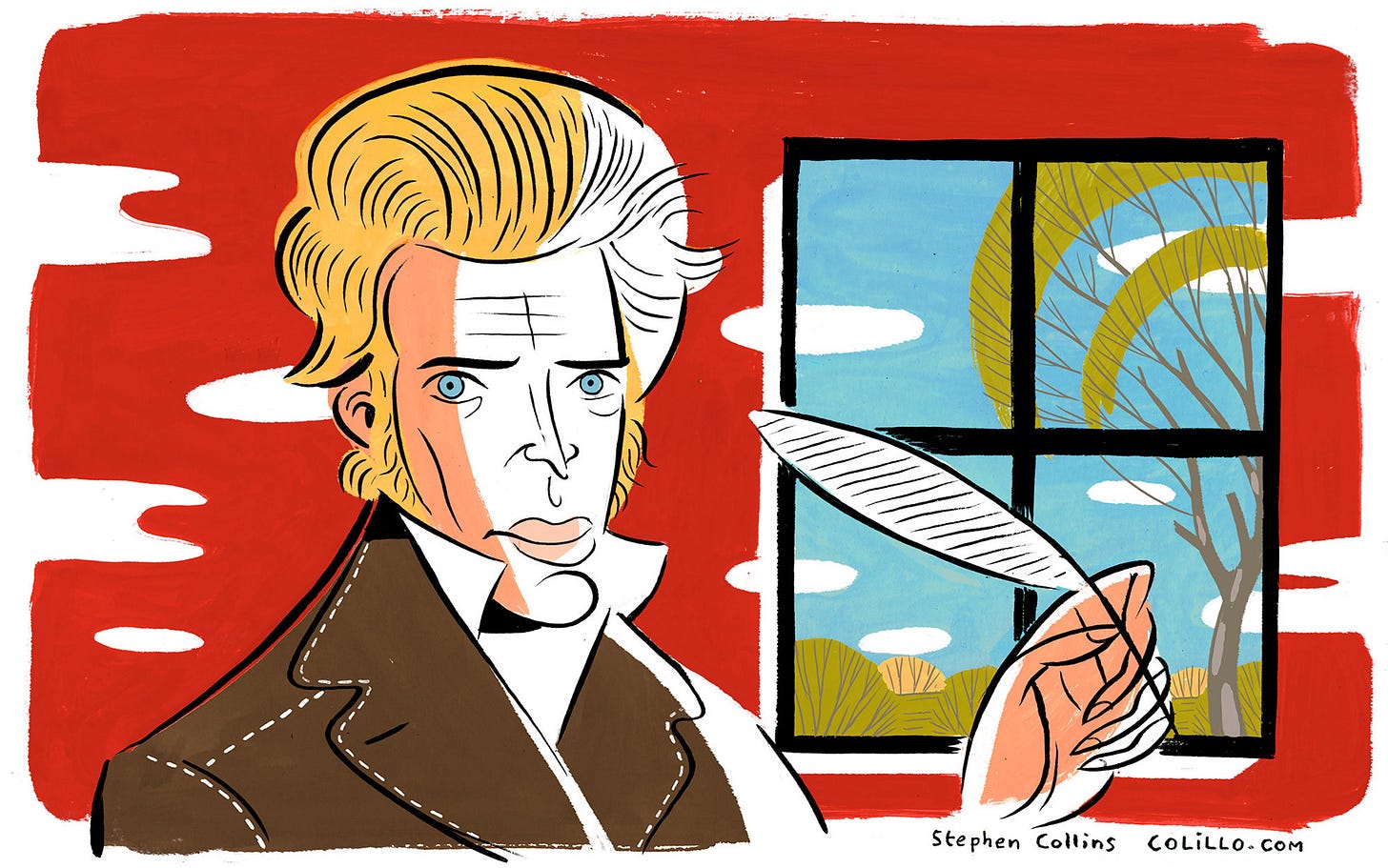The problem with 'being authentic'
An inquiry into the notion of the true-self and an understanding of authenticity as a 'vocation'
Welcome to Wait! Just Listen, a weekly series of short essays dedicated to unpacking moments of humanness from the all-consuming web of digitisation. If this type of content enriches your life in any way, please consider subscribing. If you need more reasons to subscribe, then click here. Twitter is my primary method for tracking the cultural and creative pulse of various ideas, so feel free to get in touch (@trippingwords) if you have a topic or theme you’d like me to explore.
“Face the facts of being what you are, for that is what changes what you are”
- Søren Kierkegaard
We have an insatiable hunger for the real—artistically, complexly, enigmatically and comically. This thirst for reality has been deftly commodified in books, TV shows, through social media and now further heightened with the presiding craze for NFT art. In each instance, the promise of authenticity and unfettered access into a ‘temple of truth’, is neatly packaged and persuasively sold.
But yet, we know. We know that every proclaimed or perceived instance of authenticity, brings forth more questions of what realness actually means. Because there is no rulebook on what it takes to maintain the truth of ones identity or an explainer of what the truth even looks like.
Often the idealised self, the self we present to the world on various social media platforms and public avenues represents the aspirational self of who we would like to be rather than who we are — a self that obscures our incompleteness and imperfection, which are inextricable qualities of our richest humanity. One would assume that ‘true authenticity’ resides beyond these bustling superficialities of society. But how do we look for something without knowing what we are looking for?
The work of Danish philosopher Søren Kierkegaard is perhaps the closest we will ever be to an inner sanctum of self-hood and authenticity. Nowhere does his genius shine more luminously than in his exploration of identity and the masks behind which we hide our innermost selves from others — and even from ourselves. There is an enormous elegance and piercing precision to Kierkegaard’s insight into the human condition.
Kierkegaard’s professional and personal life was in itself a testament to the arduous journey he undertook to discover an authentic self-hood. For a start, he published under several Latin pseudonyms, which suggests a desire for concealment, but his chosen names were audacious and flamboyantly colourful —Johannes de Silentio, Constantin Constantius, Vigilius Haufniensis (loosely translated as “the watchman of Copenhagen”)—that he may well have wanted to draw attention to his authorship. He seemed intent on caricaturing any attempt at negotiating identity and anonymity - because for him the notion of authenticity didn’t exist solely in the material realm of life.
In fact, for Kierkegaard, the materialistic trappings of life shape our view of authenticity but it obscures what it means to live authentically. Kierkegaard asserts that to attain clarity on living an authentic life one requires a more objective and spiritually conceived roadmap. And for what it’s worth, he was a man of his word.
He swiftly breaks up with his long-term fiancee, Regine Olsen, to the bewilderment of close friends. It was a decision fuelled by a sudden conviction (a transcendental realisation) that marriage brought a life of uncapped misery and it required a level of commitment he could not provide. Subsequently, Kierkegaard goes on to adopt the life of a hermit and holes up in his apartment, where a kind of a scribomania compels him to shun sleeping and all forms of socialisation in favour of frenetic writing. He maintained his feverish writing pace over the span of a few years, until which he had accumulated volumes’ worth of manuscripts.
Writing allowed Kierkegaard to step outside the claustrophobia of human judgement and life’s never-ending barrage of disappointments. It provided him with a gateway to explore the mechanics of authenticity at a more ethereal level, whilst keeping a somewhat detached eye on the state of reality.
In Kierkegaard’s view, being authentic is not a matter of solitary introspection, but rather a passionate commitment to transcendence - a relation to something outside oneself that bestows one’s life with meaning. As a self-proclaimed religious thinker, this ultimate commitment was his relation to God. The idea is that passionate belief about something outside ourselves gives life an enduring coherence - a life of meaning.
But Kierkegaard in his true contradictory form, was not averse to the material world of life experiences. He argued that if one purely focuses on the transcendental and divine, we ultimately become detached from the facts of life.
Kierkegaard’s take on authenticity involves appealing to a ‘higher power’ for clarity whilst acknowledging the material conditions that justify our real-world feelings.
In other words, for Kierkegaard, authenticity (or the state of being authentic) isn’t purely an esoteric divine experience but an ever-changing point of intersection between clarity - an acknowledgement of real-world situations, and distance - a reflection on what we value most over and above the corporeal world of hardened reality.
Authenticity as a Vocation
Kierkegaard’s profound conceptualisation of authenticity has made me think about authenticity as a vocation.
A vocation, in its most rudimentary secularised form, is an ongoing role/identity that a person assumes in accordance to a broader plan, structure or some semblance of it. There is an implicit acceptance of the the challenges and uncertainties that may arise in pursuing that plan. But most importantly, there is a fruitful tension between passion and duty.
Kierkegaard’s understanding of duty was unequivocally attributed to the notion of an overarching divine plan. However, duty in the broadest secular sense refers to the acceptance of a calling that quietly but persistently hymns from within. This sense of duty cannot be attributed to any one source; it is an inward pull towards a specific field, cause, or idea. For some, that calling may involve a very specific area of specialisation while for others, it could be a natural predisposition to a particular way of life/living.
Passion ultimately gravitates us (in sometimes contradictory ways) towards that calling. It drives us to accept, reject and discern between various life circumstances and events.
Authenticity then, is part of an ongoing vocation through which we develop, sharpen and re-configure our instinct to discover transient experiences that have an inherent and intimate relatability to us as human beings. It has a pedagogical quality that involves learning and unlearning, doing and undoing.
There is a medieval flavour to perceiving authenticity as a vocation. In metaphorical terms, we humans are craftsmen honing the art and chipping away (subliminally or otherwise) at identifying momentary slices of reality that resonate with us. A reality that allows for a temporary dovetailing between our calling and real-world passions. Temporary, because life is never constant. Our conditions of existence are continuously changing.
The authentic self has no final form or destination. It does not hide behind a grand or storied revelation. It is perennially incomplete. A constant work in progress. It exists only in its unfinished state.
Yet we’ve been culturally programmed to navigate the maze of the human experience, armed with the false hope of arriving at some finite version of the authentic self- where ‘the real’ is unflinchingly captured in all its gritty glory. We’ve been taught to conform to social expectations of authenticity like obedient foot-soldiers.
“Find your authentic voice”, “Let the real you shine”, “Show your genuine self” and the most cringeworthy of all statements, “Bring your whole self to work”. These seemingly innocent pseudo-aphorisms can potentially inflict painful damage to our self-worth and most notably our mental health. What if the “real you” never arrives? What if you’ve spent years trying to carve out an “authentic voice” only to be told that you haven’t found it?
Relinquishing the urge to control and craft that ‘Hollywood moment’ of authenticity (either to one’s self or others) might just be the centrepiece to living a full life, enriching the purpose of our vocation.






Brilliant! I love that perspective although I've never thought of authenticity as a vocation.
I still think authenticity is about weirdness (tweeted few times about it today, and will probably write an essay about it), but now maybe I should look at it as "discovering your own weirdness"? Because if something is called truly authentic, it must be different, unique in a way. So many people will inevitably perceive it as weird.
--
This one is my favourite part:
"The authentic self has no final form or destination. It does not hide behind a grand or storied revelation. It is perennially incomplete. A constant work in progress. It exists only in its unfinished state. "
It's interesting to see "authenticity" as a process with no end. This is particularly interesting if we define it this way. So "authenticity" is not a state or your "voice"/"style"/etc but a journey, your unique way of living and doing things and expressing it in art forms. What do you think?
Cheers,
John
An exceptionally deep and extensive discussion of "being authentic", particularly in relation to thought processes of one's life. It is a marvel that you have encapsulated such complex thought processes in this one article. Thank you for writing yet another fabulously thought provoking article, as always.